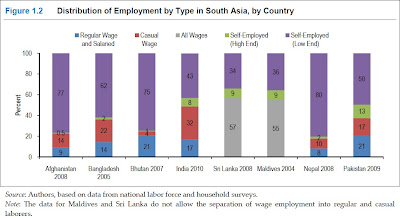PakAlumni Worldwide: The Global Social Network
The Global Social Network
IBA's Global Entrepreneurship Monitor (GEM) Report on Pakistan
A recent report by the Center for Entrepreneurial Development (CED) of the Institute of Business Administration (IBA) finds that Pakistanis are less entrepreneurial than their counterparts in the majority of 59 member nations of Global Entrepreneurship Monitor (GEM), according to Express Tribune newspaper. The report says that the new business ownership rate, which is the percentage of owner-managers of a business that is three to 42 months old, is 2.7% in Pakistan, "considerably less" than the average rate for factor-driven economies (11.8%).
The results of this IBA CED study, as reported by the media, run counter to the findings of a recent World Bank report titled "More and Better Jobs in South Asia" which shows that 63% of Pakistan's workforce is self-employed, including 13% high-end self-employed. Salaried and daily wage earners make up only 37% of the workforce.
Even if one chooses to consider just the 13% who are high-end self-employed as entrepreneurs, it's still much higher than the 2.7% figure reported by CED, and higher than the 11.8% average reported for factor-driven economies covered by GEM.
It seems to me that this discrepancy stems from a very narrow and limited definition of entrepreneurship used in the IBA study which ignores the following realities:
1. The rapid urbanization from massive ongoing rural-to-urban migration in... is spawning a whole generation of small entrepreneurs who end up working for themselves as small vendors selling their wares on the streets and independent service providers who do basic chores like cooking and cleaning for dozens of clients. Each of these individuals is an entrepreneur by definition. Some of them have also found their way to other nations in Europe and the Middle East where they are earning a good living as street vendors. I saw a recent example of a Pakistani street vendor in Italy who earned enough to send his children to universities....a luxury he didn't have himself.
2. There are many small groups of men and women who are starting businesses at home in both urban and rural areas of the country to sell groceries, sew clothes, raise animals for milk, grow and sell fruits and vegetables, cater cooked food, etc. These small entrepreneurs are managing to put food on their families' tables and put children through good schools. Some of them are being funded and trained by microfinance institutions like Kashf Foundation and others.
People at academic institutions like the IBA who talk about entrepreneurship must research examples like Kraft Foods and Carl's Junior, both of which had humble beginnings on the streets of the United States.
James L. Kraft started Kraft foods by selling milk and cheese from a horse-drawn cart in Chicago in 1903; its first year of operations was "dismal", losing US$3,000 and a horse. Today, Kraft Foods is a multi-billion dollar multinational corporation selling a variety of food products around the globe, including Pakistan.
Carl's Jr, a multi-national fast food giant which operates Hardy's restaurants in Pakistan, began life as a hot dog stand in southern California 1941 with $311 in capital. One cart grew to four, and within five years, Carl's Drive-In Barbecue opened with hamburgers on the menu.
I believe that most Pakistanis are not risk-averse. What is lacking is a supportive environment to help nurture millions of small entrepreneurs to enable them to realize their dreams. The efforts of microfinance sector need to be supported by both the public and private sector through skills training, mentoring and greater funding. Each of us who can afford to help can do so by joining microfinance networks like Kiva.org to lend to such entrepreneurs in Pakistan.
Tags:
- Attachments:
-
-
 GEM Pakistan 2010 Report.pdf, 2.9 MB
GEM Pakistan 2010 Report.pdf, 2.9 MB -
 PIDE Entrepreneurship Pakistan.pdf, 201 KB
PIDE Entrepreneurship Pakistan.pdf, 201 KB
-
Replies to This Discussion
Twitter Feed
Live Traffic Feed
Sponsored Links
South Asia Investor Review
Investor Information Blog
Haq's Musings
Riaz Haq's Current Affairs Blog
Please Bookmark This Page!
Blog Posts
Indian NSA Doval Urges Young Hindus to Take Revenge on Muslims
In a recent speech to young Hindus in New Delhi, the Indian National Security Advisor Ajit Doval urged his audience to "avenge history". He talked about the looting and destruction of Hindu temples and many centuries humiliation suffered by Indians. Though he did not…
ContinuePosted by Riaz Haq on January 14, 2026 at 2:00pm — 1 Comment
Pakistan Household Survey HIES 2024-25 Raises More Questions Than It Answers
Recently released HIES 2024-25 household integrated economic survey by Pakistan Bureau of Statistics (PBS) raises more questions than it answers. For example, it shows that Pakistani households are buying lower amounts of basic food ingredients like wheat, meat and eggs in the last four years, implying that people are eating less to cover other expenses, like electricity and gas. But it doesn't explain why the households have reported significantly lower purchases of these items than…
ContinuePosted by Riaz Haq on January 6, 2026 at 5:00pm
© 2026 Created by Riaz Haq.
Powered by
![]()
